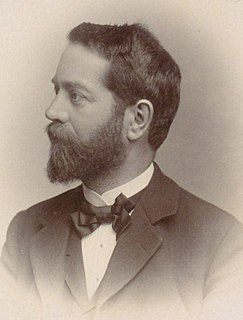A Quote by Jean-Paul Sartre
That of War and Peace or of Almagestes. All are satisfactory. The only criterion of a work
is its validity: that it should grip and that it should last.
Related Quotes
Francis of Assisi tells us we should work to build peace. But there is no true peace without truth! There cannot be true peace if everyone is his own criterion, if everyone can always claim exclusively his own rights, without at the same time caring for the good of others, of everyone, on the basis of the nature that unites every human being on this earth.
Sir, it is true that republics have often been cradled in war, but more often they have met with a grave in that cradle. Peace is the interest, the policy, the nature of a popular Government. War may bring benefits to a few, but privation and loss are the lot of the many. An appeal to arms should be the last resort, and only by national rights or national honor can it be justified.
Particularly when the war power is invoked to do things to the liberties of people, or to their property or economy that only indirectly affect conduct of the war and do not relate to the engagement of the war itself, the constitutional basis should be scrutinized with care. ... I would not be willing to hold that war powers may be indefinitely prolonged merely by keeping legally alive a state of war that had in fact ended. I cannot accept the argument that war powers last as long as the effects and consequences of war for if so they are permanent -- as permanent as the war debts.
The twentieth century had dispensed with the formal declaration of war and introduced the fifth column, sabotage, cold war, and war by proxy, but that was only the begining. Summit meetings for disarmament pursued mutual understanding and a balance of power but were also held to learn the strengths and weaknesses of the enemy. The world of the war-or-peace alternative became a world in which war was peace and peace war.
The cry has been that when war is declared, all opposition should therefore be hushed. A sentiment more unworthy of a free country could hardly be propagated. If the doctrine be admitted, rulers have only to declare war and they are screened at once from scrutiny. . . . In war, then, as in peace, assert the freedom of speech and of the press. Cling to this as the bulwark of all our rights and privileges.
The presentation of mathematics in schools should be psychological and not systematic. The teacher, so to speak, should be a diplomat. He must take account of the psychic processes in the boy in order to grip his interest, and he will succeed only if he presents things in a form intuitively comprehensible. A more abstract presentation is only possible in the upper classes.
War is harmful, not only to the conquered but to the conqueror. Society has arisen out of the works of peace; the essence of society is peacemaking. Peace and not war is the father of all things. Only economic action has created the wealth around us; labor, not the profession of arms, brings happiness. Peace builds, war destroys.







































